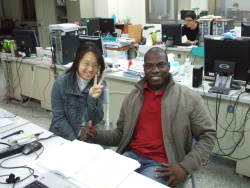
MY STUDY/RESEARCH EXPERIENCE AT TAIWAN
Three months yet, I have been living in Taiwan, especially in Tainan city where i am studying civil engineering and management at National Cheng Kung University (NCKU). I start to know a lot about Taiwan: it is not only the country of the sun as I saw that when I had come here at the end of summer; it is not only the country of typhoons and the cold where the sun and the heat of the day disappear, where people are forced to stay at home;Taiwan has a rich environment.
During the orientation visits, I contemplated a lot the mountains with a wonderful vegetal cover in the suburbs of Taipei. At that moment, I became full of nostalgia, thinking about some mountainous parts of Haiti covered of trees: Montagne noire (Black Mountain), Turgeau, Kenskoff, Leogane, Bordes(Jeremie), Dame-marie, Labadee, etc…Taiwan is also a peaceful country, according to my point of view, where people know how to enjoy their life. The foreigners like me are welcome and offered many entertainments.
On the other side, in Taiwan, people are hard-worker and very interested in education. In fact, at NCKU for example there is a time to entertain, there is a time to work hard, a time to struggle with the homeworks from the morning until late at night. That is through this encouraging atmosphere the recipients of ICDF scholarship start their research.
For my part, in order to enter deeply into my goal, this semester I have chosen these courses: Management Information Systems, Financial and Cost Concepts for Engineering and Construction, Airports Engineering and Management plus the Chinese course.
Thanks to the course Management Information Systems, I am already able to:
Describe options for designing and conducting interviews and develop a plan for conducting an interview to determine systems requirements.
Explain how computing can provide support for requirements;
Describe contemporary approaches to requirements determination;
Understand how requirements determination techniques apply to the devepment of electronic commerce applications;
Understand the logical modeling of processes by studying examples of data flow diagrams;
Use data flow diagrams as a tool to support the analysis of information systems;
Use structured English as a tool for representing steps in logical processes in data flow diagrams;
Use decision tables to represent the logic of choice in conditional statements;
Understand how logic modeling techniques apply to the development of electronic commerce applications;
Draw an entity-relationship diagram to represent common business situations;
Explain the role of conceptual data modeling in overall analysis and design of an information system;
Design databases;
Explain the role of designing databases in the analysis and design of an information system etc….
In Financial cost concepts for Engineering and Construction, I have already learned how management use historical data and estimated data in conducting daily operations, planning future operations, and developing overall business strategies.
Moreover, in Airports Engineering and Management, I have already learned how to prepare master plans for existing airports and construction of new ones.
The course outlines the planning system and development of long-term forecasts covering aviation operations, economic factors and other considerations involved in master planning. It explains the need for consultation and co-operative planning by all the agencies concerned, including aircraft operators, national and local government planners and international agencies. Further, guidance is given on deciding the type of airport which may be required to meet the needs of a community or region and the selection and evaluation of airport sites.
The importance of balancing the respective capacities of the many elements of the master plan and of ensuring flexibility and expansibility to meet is shown, with methods of achieving these objectives. Guidance is provided on assessing the capacity of individual facilities and on planning runway, taxiway and apron configurations, passenger buildings, ground transportation links and internal roads, car parks and cargo areas, to permit phased development of the master plan.
It is a thick and substantial program. Things look promising. So, through the above courses and the incoming ones, I am already able to build a framework of my thesis.
Winder DORISMOND
NCKU
|







